Follow Your Passion: A Seamless Tumblr Journey
Good Advice - Blog Posts
young artist posting your work online, heed my warning. im holding your face so gently in my hands, you have to stop caring about numbers right now and start caring about making the weirdest and most self-indulgent art you possibly can
Gentle reminder that often creativity decides to hibernate for a bit.
It’s okay. You’re not broken, you’re resting, and much like spring, creativity comes back.
"Stop saying 15 year olds with weird interests are cringe, they're 15" this is true however you should also stop saying adults with weird interests are cringe because who gives a shit
don't panic buy games because of the eshop shutdown!!!! the memes are not lying It is genuinely very easy to hack your 3ds!!! please do it!!!!
3ds.hacks.guide
(don't follow video guides they are very often outdated and it's easier to make mistakes that way. this guide is very detailed with step by step instructions and they even have a support server in the event you have any trouble! i understand it might seem intimidating but risks of bricking or banning are very minimal at this point you will be glad you did it)



What would be your advice to you from five years ago?
I always regret not shooting my shot for friendship in classes that I sometimes think about them after the course is over (what could have been a great friendship). Be that fucking person and say ‘hello’ first. Just stop holding back.
I wanna tell you guys a secret to making friends and it's gonna blow your mind....
Talk to people
That's literally it
And tbh I literally just realized this- because like- for the past year or so I've been going up to random blogs and just "interacting" (technically talking with reblogs and asks) and in my head I've been like "my power to make people like me by annoying them somehow shall grow!" And I've just now realized- that's not a power, that's not a skill, that just talking to someone and being fucking respectful
And it's like
Wow
Because like even just saying "hello" at least opens up the option to start talking and exploring other things to say and interacting more and it's- it's genuinely fun, and most of the time leads to fun friendships
It's literally like
I used to be like "I wish I could he friends with this blogger but they'll never see my blog" but- yes they will, I just gotta show up in their ask box/reblogs and if they wanna talk or if they find me interesting all they gotta do it respond back and then conversations just keep going from there....
It seems like it should be obvious but I feel like it isn't because I've noticed some other people are like that sometimes where they're like "I wish I could be friends with this person but they'll never notice me T^T" and it's like- cool, I know you probably have anxiety, I know you're probably an introvert, but I've discovered that working yourself up just to say "hi" literally makes the person wanna talk to you more, especially if you're the one to talk first cause then they won't worry about you not liking them because guess what you'll never believe it- most of the time they feel the exact same way about talking to people and are like "if I speak they'll hate me" so just- if you wanna be friends with people just give them a quick little hello or hi to let them know you don't have them and you're open to conversate
Trust me, it does wonders
Console-free Camping
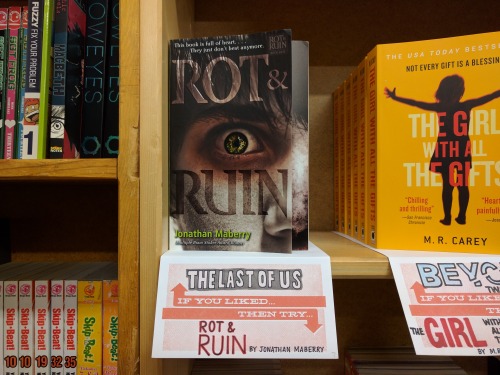
If you like to play The Last of Us, then try Rot & Ruin by Jonathan Maberry
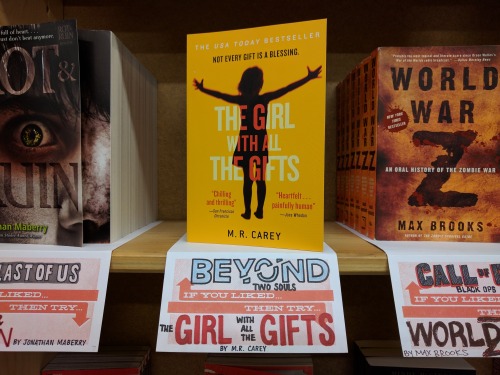
If you like to play Beyond: Two Souls, then try The Girl With All the Gifts by M.R. Carey

If you like to play Call of Duty: Black Ops (Zombies), then try World War Z by Max Brooks
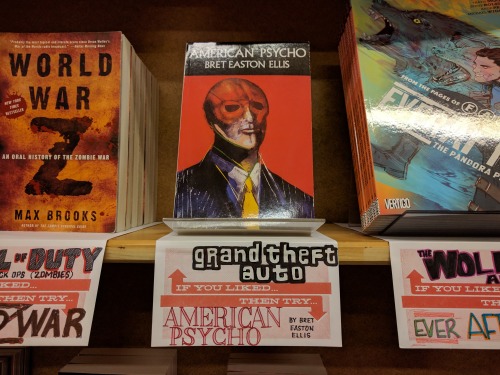
If you like playing Grand Theft Auto, then try American Psycho by Bret Easton Ellis
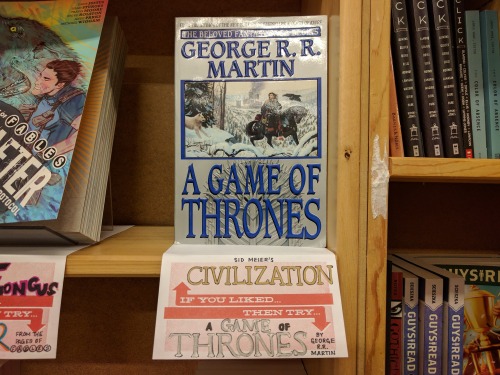
If you like playing Sid Meier’s Civilization, then try A Game Of Thrones by George R. R. Martin
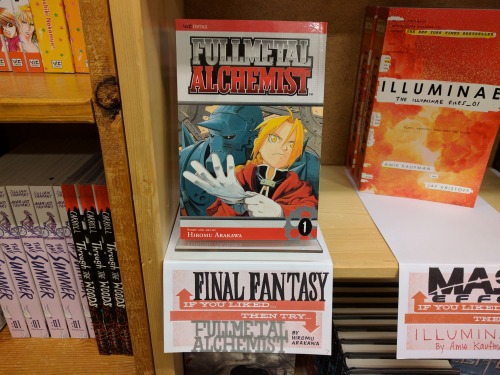
If you like playing Final Fantasy, try playing Fullmetal Alchemist by Hiromu Arakawa

If you like playing Mass Effect, then try Illuminae by Amie Kaufman and Jay Kristoff
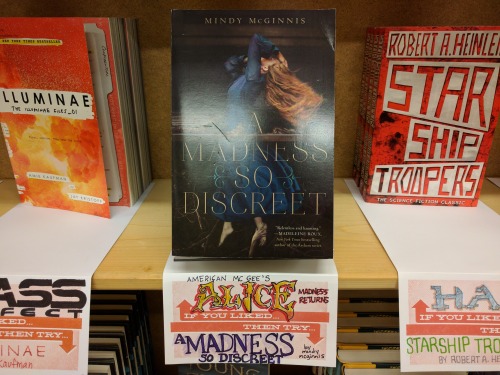
If you like playing Alice: Madness Returns, then try Madness So Discreet by Mindy McGinnis
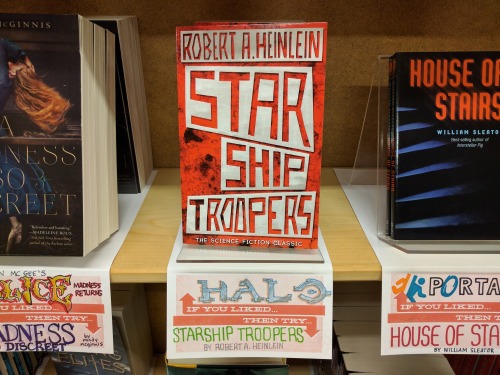
If you like playing Halo, then try Starship Troopers by Robert A Heinlein

If you like playing Portal, then try House Of Stairs by William Sleator
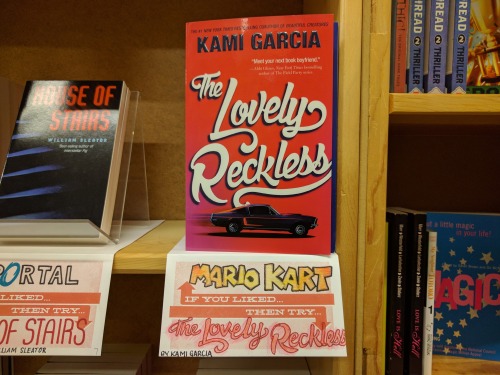
If you like playing Mario Kart, then try The Lovely Reckless by Kami Garcia
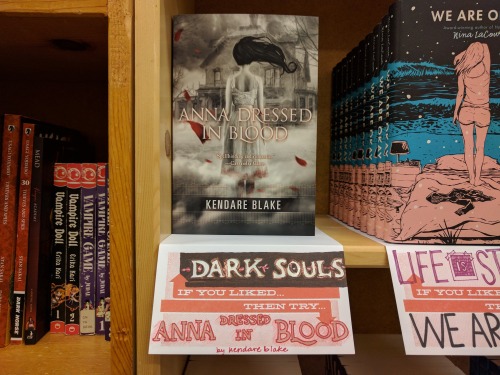
If you like playing Dark Souls, then try Anna Dressed in Blood by Kendare Blake

If you like playing Life Is Strange, then try We Are Okay by Nina Lacour
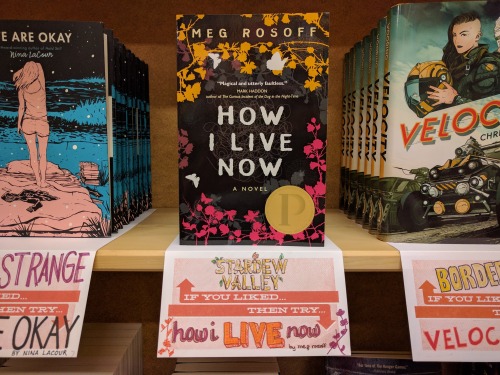
If you like playing Stardew Valley, then try How I Live Now by Meg Rosoff
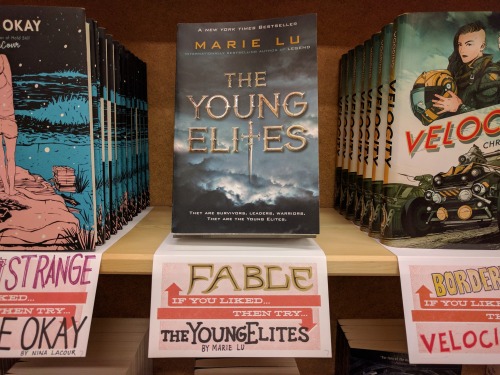
If you like playing Fable, then try Young Elites by Marie Lu

If you like playing Borderlands, then try Velocity by Chris Wooding
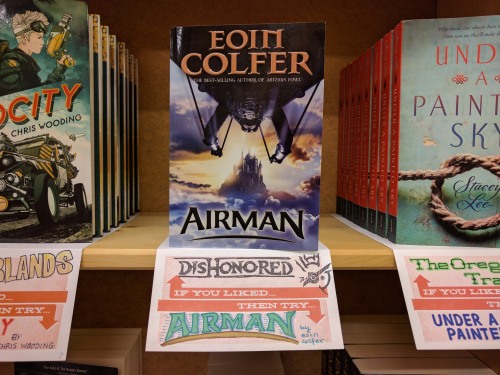
If you like playing Dishonored, then try Airman by Eoin Colfer
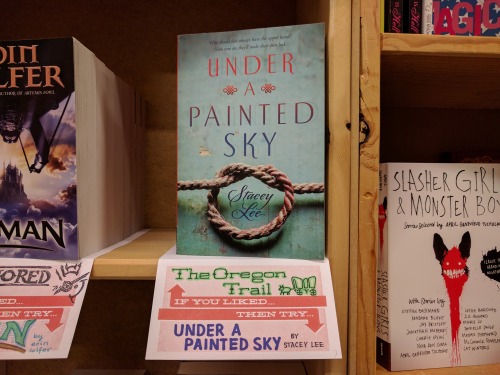
If you like playing The Oregon Trail, then try Under a Painted Sky by Stacey Lee
If you like playing the Elder Scrolls series, then try The Naming by Alison Croggon
If you like playing Red Dead Redemption, then try Vengeance Road by Erin Bowman
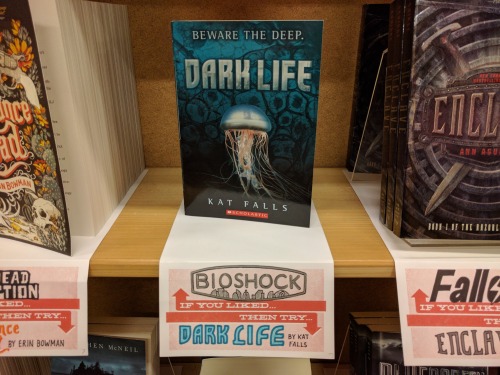
If you like playing Bioshock, then try Dark Life by Kat Falls

If you like playing Fallout, then try Razorland by Ann Aguirre

If you like playing Assasin’s Creed, then try The Way of Shadows Night by Brent Weeks
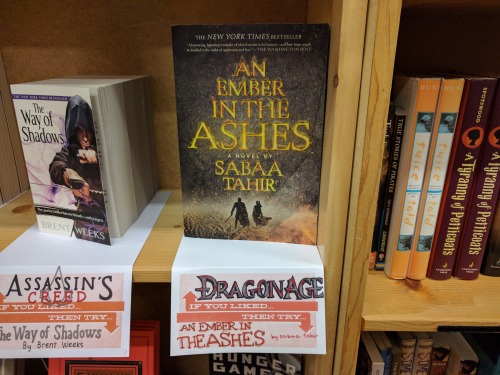
If you like playing Dragonage, then try Ember in the Ashes by Sabaa Tahir
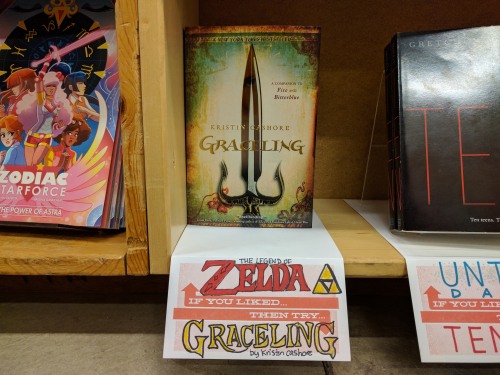
If you like playing The Legend of Zelda, then try Graceling by Kristin Cashore
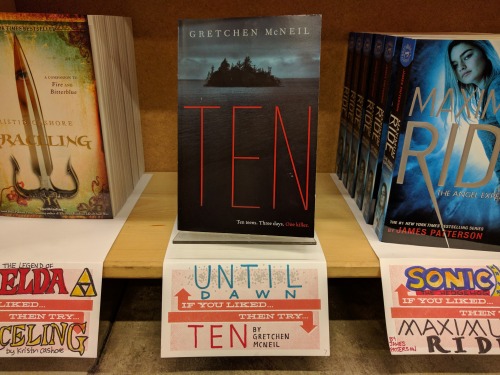
If you like playing Until Dawn, then try Ten by Gretchen McNeil
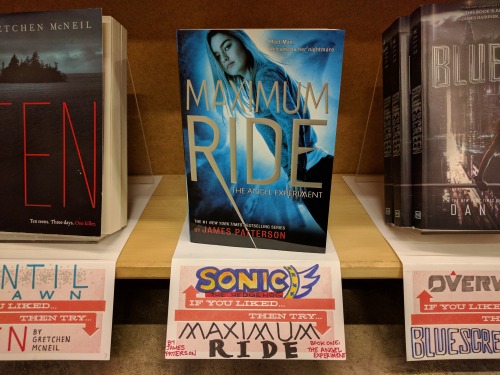
If you like playing Sonic, then try Maximum Ride by James Patterson
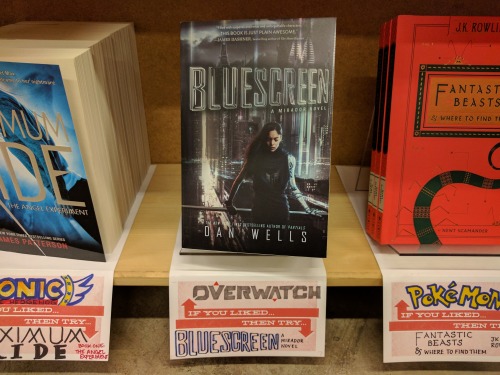
If you like playing Overwatch, then try Bluescreen by Dan Wells
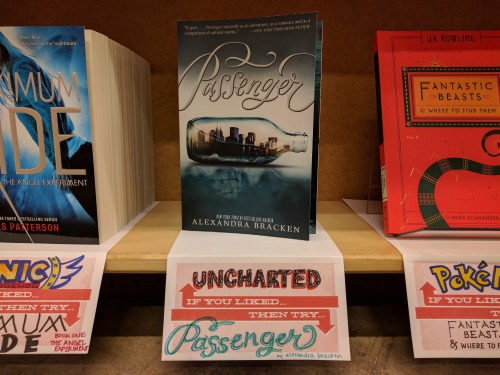
If you like playing Uncharted, then try Passenger by Alexandra Bracken

If you like playing Pokemon, then try Fantastic Beasts & Where to Find Them by JK Rowling, and Newt Scamander
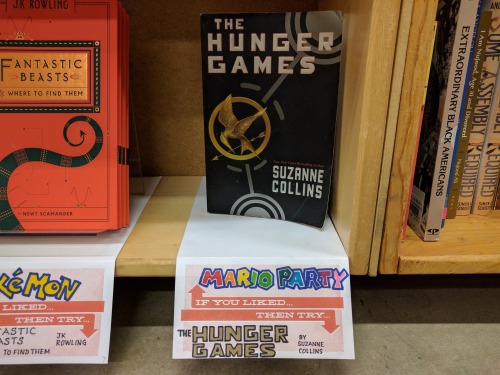
If you like playing Mario Party, then try Hunger Games by Suzanne Collins






“I wish I was a girl.”
This comic was inspired from a conversation, that’s why it looks a bit awkward because I cut some things out. (I’m a drawer, not a keyboard. 😏 get it?…)
I hope that some people are able to relate to this, and know that your supported and its good to take ur time.
The only thing I can say about writing right now is that you don’t need to polish or even finish everything you write. Unfinished works hold value just as intrinsically as finished ones; if finishing a project holds no appeal, move on. Maybe one day you’ll return to it, find an idea to nurture and raise. Maybe you’ll never look at it again, but the words were still written. The sentences were crafted. This unfinished thing is a sketch, then, forgotten in the depths of your sketchbook; why should we hold writers to different standards than other artists? Play around and have fun. Finish projects if you want to; move on if you don’t. Don’t guilt yourself over something with no moral bearing. Just write.

Daily reminder… brought to you by one of my coffee cups. 🧡
🔥💯
If you see beauty in something, don't wait for others to agree.
Sherihan Gamal
Indeed we do, and this is how it works.
“We often want it so badly that we ruin it before it begins. Overthinking. Fantasizing. Imagining. Expecting. Worrying. Doubting. Just let it naturally evolve”
— Unknown
Welp…
Dark!Buddha: get attached to everything. develop attachments to whatever you see that are so profound you go insane
Spoken like a true hero (and ally.) 😌 Point made, loud and strong.
As someone who works a lot with Infernals and some other more “taboo” deities and subjects, I am SO glad to see this. I think we can all learn a thing or two from keeping an open mind.
can ppl stop shitting on demons please
Hell is, like, really, really big. And diverse. There are as many kinds of demons as there are spirits in general.
Not all of them are evil. They don’t all want your soul, or to tempt you, or to deceive you.
JUST LEAVE MY FRIENDS ALONE OKAY
Let's go, then.
Friendly reminder that you should
Write that fic
Draw your OC
Redesign that blorbo
Plan that comic how you want
Create the content you want to see
Be cringe
Be free
The only thing that matters is you having fun! Not what others think!
Step one: put your enemies hand in a panini maker-
Step two: enjoy.
DON'T BE TRASH
T - Transphobic
R - Racist
A - Ableist
S - Sexist
H - Homophobic
Even if you can’t have that quiet life you wish for, try to take some moments to be quiet. It’s hard to unplug, it’s hard to be in silence, it’s hard to let go of some thoughts. But try to be quiet even for a few minutes every day, or to at least occupy your mind with things that are not the usual stressful subjects of every day life - like disease, war, social issues. I’m not asking you to become ignorant and to self-isolate. I’m asking that you take a short break before your body forces you to take a longer one when it becomes exhausted.
This is all really useful
How to Kick Ass at Worldbuilding

Worldbuilding. You either love it and spend all your time dreaming up rules rather than writing, or you hate it and try your best to avoid it despite writing fantasy or scifi.
Or you are in the middle, which is where you should be. You have a healthy appreciation for what makes worldbuilding so special, but you also don't obsess over it.
Worldbuilding does not need to be complicated to be effective, as I've harped on a few different times now. So how do you strike the right balance? Let's take a look.
As always, this is just my opinion based on my own efforts creating The Eirenic Verses. You can disagree and that is fine. However, I hope you'll consider thinking about what I offer here as you craft your own world.
A lot of what people focus on when worldbuilding is not what the audience cares about.
Very few people like to read a book littered with random terms they have to keep track of. We want to build a unique world, but we also don't want to throw such an extreme amount of lore at our readers that they tune out.
When worldbuilding, we want to consider the cognitive load on our audience. This is how much information the reader needs to remember throughout your story so that they can follow along.
Cognitive load includes things like:
Character names and appearances
Relationships between characters
Place names, such as cities and countries
Unique mythological creature or fauna
Backstory, including mythology and folklore
Language names
The general plot (who is the protag, who is the enemy, etc)
Magic usage (who has the power, how they acquire it, any conditions it comes with, etc)
Power dynamics between characters, countries, and so on
Political systems, if included
Even in the most barebones fantasy story, this is a lot to remember. As such, we need to consider what is most important for our readers to generally understand the plot and emphasize this, letting the rest serve as background information that is not quite as essential. The more emphasis we put on something, the more we direct a reader's attention.
At the same time, we want to create a world that feels lived-in and interesting so that readers want to know more. How do we do this?
Consider what you think about foreign countries in our world.
Most of us will have a general concept of a country but only will think about the specifics if it is currently relevant.
Let's take Japan for an example. (I'm a bit of a weeabo, okay?) Here is what I personally think about when I imagine Japan, in order of what I consider important.
Japanese cuisine (sushi, ramen, ochazuke, sake, lots of rice dishes, seafood)
What the people are like according to my own stereotypes/cultural perceptions (polite, quiet, respectful, hardworking, punctual)
Climate and geography (temperate, island country, volcanos, mountains, beaches)
Unique flora and fauna (cherry blossoms, flowers, Nara deer, giant salamanders, pretty birds)
General landmarks, but not necessarily specifics (castles, temples, busy cities, red bridges, torii gates)
Clothing styles (kimonos, school uniforms, business suits, kawaii fashion)
Cultural icons (samurai swords, samurai armor, Shinto shrines)
General overview of the history (samurai, daimyo, feudal system, bushido, Meiji restoration)
Language, but not necessarily specifics of the language (Japanese, kanji, hiragana)
Religion (Buddhism and Shintoism)
Folklore (ghosts, kami, tsukumogami, evil spirits)
Any festivals I might know of (cherry blossom festivals, moon viewings, Obon)
Your own list may have these in a slightly different order, but it's probably what you most think about.
Notice that you will likely not think about these things:
Political system
Specifics of the language
Interpersonal hierarchies
International relations
Specific landmarks
Specific historical events
Famous figures
So why do we think like this? Because in real life, we also have a cognitive load that we must balance with things that are more relevant to our everyday lives.
If I tried to memorize specific details of every country in the world, I would go insane. I have better things to do, so I create a general image of a country based on pictures I've seen, people I've met, food I've eaten, and so on. You do the same thing.
To be realistic, you do not need to be specific. You need to approach worldbuilding the same way people generate their world knowledge: basic concepts and visual imagery.
What to emphasize in worldbuilding
So let's break this down on what you want to think about when creating a world.
Food is one of the most accessible elements of a culture.
Food is how many people learn about different cultures for a simple reason: if you have the ingredients, you can cook food from anywhere. You don't need to be introduced to it by a native of that culture.
Plus, humans tend to like food. We kind of need it to exist.
Think about these things when considering national cuisines and eating habits of your fantasy world:
Do they have spicy food? Bland food? Heavy hearty dishes?
Is most food served hot or cold?
What kind of spices and vegetables do they use? Root vegetables, beans, cinnamon? Salt?
What type of meat do people eat (if any)? Seafood, poultry, beef, pork?
How is bread prepared? What is it made of? (Look, nearly every culture has some sort of bread, we love carbs)
What about pasta? Does that exist here?
Are desserts important? What are they made of?
What kinds of drinks do they have? Coffee, tea, milk, lemon water?
Is alcohol a thing? What kind of alcohol? How often do people drink? Are there bars?
How often do people eat, and when? Do they have the typical three square meals, or do people eat kinda whenever they feel like it?
Do people prepare food at home or are there restaurants?
Are communal dinners common?
Cultural stereotypes provide tension and can help craft your characters.
Are people in your culture known for their boldness? Their cunning? Their resilience? Their standoffishness? Their fiery tongues, or their passive-aggressive jabs?
You can play with a lot of this, either confirming or denying the assumptions through your characters.
Landscape gives us an idea of where we are and what to expect.
Landscapes are some of my favorite aspects of worldbuilding rather than intricate magic systems and political concepts. Readers get a good sense of environment when you focus in on landscape and how it impacts the characters. You can also build a culture off your landscape, such as how certain geographic features may influence peoples' attitudes and lifestyles.
For example, a coastal landscape will have beautiful views of the ocean, sparkling beaches, and maybe tall cliffs. Being a fisherman may be seen as an honorable but dangerous profession. People might cliff dive for fun.
Mountainous areas may produce cultural enclaves, especially in a fantasy setting where everyone is more isolated. One mountain town may have a completely different vibe than the town over.
Flat, wide-open plains mean people can spread out, but since moving from one place to another is easier, there may be a more cohesive culture.
An area with caves will have a sense of mystery and fear; there may be a lot of superstitions about the caves.
A swampy area can also be very mysterious as there are so many places to hide out and a lot of dangerous animals.
Climate influences how people behave.
Hot climates make people need to conserve energy, so they may take afternoon naps in the worst of the heat. They might value relaxation and calm over industry and productivity because bro, have you ever tried to even walk outside in the Florida heat? Shut up and get me air conditioning.
Cold climates make people need to stay active to stay warm, but they can also produce a sense of isolation. Think about how outdoorsy the Finnish are but how they looove their personal space.
Temperate climates are probably a bit more even-tempered, but as weather changes get more extreme, people will vary their behaviors based on the seasons: spending more time outdoors during summer but holing up during winter. The culture may emphasize hospitality because people need to rely on one another to survive, and they have time to meet their neighbors during the summer.
I am very partial to temperate climates, being from the American Midwest. We're known for being nice and hardy people. You should come visit.
Flora and fauna help the world feel real.
When I worldbuild, I often base my cultures on a real place and what kinds of animals or plants are there. For example, Breme is based on Mongolia so I have herbivores, big raptors, and a lot of grasses.
A warm climate will have lots of reptiles. Sea life will be important in a coastal area. Swamps might have big predators. Mountains will have hardy creatures that can climb. A savannah area will have huge herbivores and fast, hungry predators.
General cityscapes or villages are great for providing a sense of place.
Do people build low spread-out cities or tall rickety homes? What kinds of building materials do they use? Are there lots of markets, bars, apocetharies, temples or churches? What do homes look like here? What are any unique architectural features?
This gives a sense that we are in a different but specific world that has a rich culture.
Clothing tells us what people prioritize.
Cold places will have lots of layers. Hot places will have soft draping outfits or very skimpy outfits. Natural materials that are easily available will make up the majority of the clothing in a fantasy setting. You wouldn't have people wearing cotton in a place that doesn't grow cotton. If there are lots of sheep, people will wear wool. If there's lots of cattle, people will wear leather.
You can also think about adornment. Is jewelry common? What type? Why is it important? Is it a status symbol, a way to keep wealth, or perhaps ways to honor ancestors?
Cultural icons demonstrate what the society values.
A warlike culture will prioritize weaponry. A pacifist culture will think about art and music. A nomadic culture may have a rich oral tradition. An agrarian society will emphasize farming rituals.
Think of a few things that symbolize your society, whether that's musical instruments, weaponry, textiles, statues, or jewelry. Consider how those traditions could have come about and why.
Folklore and mythology offer an offbeat but important sense of history.
Folklore is often tied up with many other factors of a society, such as their religion, landscape, history, and overall values.
For example, the Japanese believe items survive for over a century gain a kami, or spiritual essence. This shows that the Japanese cherish their long history and their material culture, and it also infuses their Shinto belief into folklore.
You can also think about cryptids or ghost stories. Isolated and difficult terrain often makes people think of monsters lurking in the woods. Areas with lots of caves will have myths about what is down there. Coastal areas develop myths about ghost ships.
Idioms, turns of phrase, and gestural quirks tell us more about the culture without overwhelming readers.
This one can be more challenging (I haven't done much with it) but if you can manage it, you'll have a very rewarding story.
I'm not talking about making a whole new language here, but rather about idioms and turns of phrase. Think about all the fun idioms that English has, like "beating around the bush" or "break a leg." Without cultural context, you can't understand them, so you'll have to incorporate an explanation without actually stating it.
For example, you can have a character say "the horses are running fast" as they look out the window to see a sheet of rain. We can guess from this that the idiom is rain = horses, so lots of rain = fast horses. We'll understand from this that this culture probably loves horses; maybe they're a formerly nomadic race.
Gestures, like whether people give thumbs-up, point with their index, or bow with their hands to their chest all give us a feeling of the culture without being overwhelming.
What not to emphasize
Now that we've gone through some things to focus on, let's talk about what you don't need to make up for your world.
A whole-cloth language
Please, you don't need to create brand new words for things that exist in our world. You can reference a language, but do not make people memorize nouns they don't need.
Don't even make up the language at all. Say there's a language and then write the rest of it in English.
Made-up languages are irritating for readers because they want to focus on the characters and plot, not mysterious words they need to translate.
It's possible to make languages interesting without going into specifics. For example, the Bas-Lag trilogy by China Mieville has a species that communicates in clicks but the species can also learn human languages if necessary. There's a language called Salt that's basically the common tongue blended from everything else.
Do we need to know how Salt works? No. Doesn't matter. We're told someone is talking in Salt, or they're learning it, or they switch to it when meeting someone from a different culture. That's plenty.
Specifics of a magic system
You're not going to instantly summon up all the rules of magical realms when you visit a new country; you might not even know them. And your readers won't be too interested in them either.
For example, in The Eirenic Verses, I have High Poetry. Readers will come to know that this was a magical system where certain people given the power can recite a poem and whatever they speak comes true. Every poem can only be used once.
It was given by the goddess Poesy to a specific woman, Saint Luridalr. It was so successful that the goddess started giving it to more women and a whole religious system arose.
I don't need to explain exactly how it works because no one cares. Someone makes things happen by coming up with a poem: that's about it. We don't need to question whether certain rhyme schemes or meter or punctuation impacts anything. That's too technical.
If you've got pages and pages of notes on all the intricacies of the magical system, you have too much. Pare it down.
Political systems
Unless you're writing a fantasy where politics are absolutely critical to the plot, you can just reference the political system in passing and maybe elucidate a few key elements, like who the leader is, how power is transferred, etc. You don't need to go into all the specifics because most people are not going to care.
Hierarchies
Please don't lay out the entirety of an army's ranking system or how someone is promoted. Make up something consistent and stick with it, but don't go into exhaustive detail. People aren't going to sit and question whether a captain is above a lieutenant or how long it takes to become a general.
We'll know that a general is a big deal if the characters make it a big deal. We'll know who the head of the army is but we don't need to know how they got to that position.
Exact city layouts
You do not need to tell us where everything is in relation to one another. Tell us characters are moving from one landmark to another. You could say "this is across a bridge, this is up in the mountains, these buildings are right next to one another, these two buildings are in opposite ends of the city." That's plenty.
If somewhere is very far away, just show them travelling there and how long it takes. You don't need to measure it in miles or leagues or whatever. We will guess that if it takes them a week to walk there, it's pretty distant.
Economic systems
We just need the basics here: mercantile, capitalist, bartering, etc. We don't need to know if the coinage is pegged to a certain precious metal or if people invest their money or how people are paid. That's boring.
In my world, I have two currencies: quillim for Breme and barnals for Sina. What's the exchange rate? I don't know and don't care. How much is one quillim worth? One quillim is not a lot but 2,500 quillim is. How much is the average person paid? Doesn't matter. Do people keep lots of coins on them? No one is asking that. It's not important.
Transit systems
Tells us if the roads are cramped, spread out, nonexistent, poorly maintained. Tell us if there are road blocks or toll booths. Tell us if there are roving bandits. The more physical and sensory you can get, the more real it feels.
Few people care about the specifics of even their own transportation system. I know highways are fast, I know tollroads are expensive, I know parkways are pretty, I know some cities have weird turnabouts and dead ends. That's exactly what I need and what I care about.
That's what I've got for you today. If you liked this, maybe you'll consider checking out The Eirenic Verses series, which follows most of these principles.
I've been told that my fantasy writing is very approachable, even for those who don't usually like fantasy, specifically because I don't get too insane with my worldbuilding. So maybe you'll enjoy it too!




